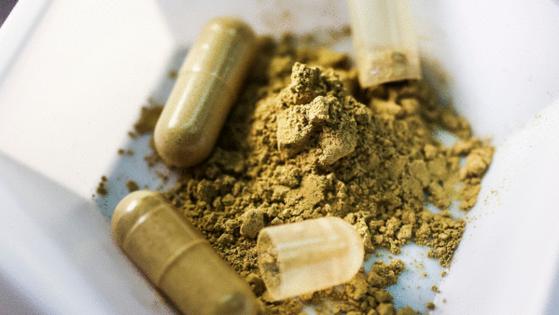Kratom to be tested for addiction risk in first-ever study
Published in Health & Fitness
Popular for its stimulating and pain-relieving properties, the herb kratom can be as easy to buy as a bag of chips in many parts of the U.S. That’s also raised questions about whether kratom should be more closely regulated.
A new U.S. Food and Drug Administration-funded clinical trial expected to begin this summer seeks to provide more insight into kratom’s potential for abuse by comparing the leaf’s draw to that of the addictive opioid oxycodone.
While it’ll take years to provide findings, the research will inform “whether we view it as a potentially therapeutic substance or something more like oxycodone that needs to be more regulated,” said Ynhi Thomas, a physician and assistant professor at Baylor College of Medicine and a co-investigator on the clinical trial.
Made from the leaves of a tree native to Southeast Asia, kratom can be found in gummy, pill and drink form and is sold everywhere from vape shops to online retailers. It’s consumed by some 2 million Americans each year for purposes including to relieve pain, opioid cravings and mental health-related symptoms.
But kratom has also been linked to overdose deaths and addiction, especially at higher doses, fueling debates over whether it should face tighter restrictions. In 2016, the Drug Enforcement Administration moved to effectively ban it by classifying it as a Schedule I drug — the same category as heroin. But after a public outcry, the agency backed down. To the extent that kratom is regulated today, it’s mainly at the state level.
The new federally-funded study being run by Baylor could help the DEA revisit kratom’s scheduling. The agency typically classifies substances into one of five different categories, with some of the most abuse-prone drugs landing in Schedule I, such as marijuana, and Schedule II, which includes cocaine and fentanyl.
“If it has high abuse potential, the DEA is more likely to place it as a Schedule I or Schedule II drug,” said Christopher Verrico, the lead investigator of the study and an associate professor at Baylor College of Medicine. “If not, they may continue to leave it unscheduled.”
The clinical trial seeks to measure abuse potential by asking participants to rate on a sliding scale how a given drug affects them, including how high they feel, how good or bad they feel and, most importantly, how much they enjoy the drug’s effects.
The researchers plan to enroll at least 60 individuals, who will be randomly assigned to one of six groups. They will receive either a placebo, oxycodone or one of three different and relatively large kratom doses, ranging from eight to 16 grams. Participants will then rotate through the different groups over time.
The key question is whether kratom will rate as more similar to oxycodone, which is known to produce pleasurable effects, or the placebo. The study is expected to cost around $5.5 million all told, and won’t release initial findings for another three years.
And while federal spending is facing significant scrutiny by President Donald Trump’s administration, “there has not been any indication that this research could be affected, at least not yet,” Verrico said.
The Baylor study is part of a broader push by the FDA to research kratom. The agency recently conducted its first human study of the herb, with preliminary results indicating that kratom leaf capsules are safe even at high doses.
That research, which enrolled 40 participants, tested capsules of kratom leaf powder against a placebo, and monitored for side effects over two days. The new clinical trial on abuse potential will build on its findings.
Verrico, who has spent decades studying drugs that have the potential to be abused, said that he’s recently noticed how widely available kratom has become, even as “scientific understanding of its risks and benefits remains limited.”
“This research is critical for informing regulatory decisions, guiding public health policies and laying the groundwork for future studies on kratom’s therapeutic potential for substance use disorders and other conditions,” he said.
______
©2025 Bloomberg L.P. Visit bloomberg.com. Distributed by Tribune Content Agency, LLC.










Comments